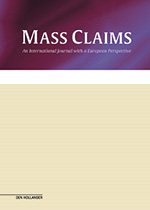Special Edition: Collective Redress in the Age of ESG
Het artikel is in de opmaak van het tijdschrift rechts als pdf beschikbaar.Foreword
Environmental, Social and Governance (ESG) considerations evolved from corporate buzzwords into legal, financial and ethical imperatives. Across jurisdictions, we are witnessing a growing wave of litigation and regulation targeting ESG concerns, from climate change and supply chain transparency to data governance. These developments reflect both the shifting public expectations and a fundamental change in how legal systems enforce corporate accountability.
Collective ESG litigation is becoming more common globally and across Europe, reflecting the fact that the underlying issues could have widespread impact on individuals and communities. This presents new challenges for courts, practitioners and policymakers, particularly given the cross-border complexities and the difficulty of quantifying long-term, systemic harm. However, it also creates opportunities for reform through strategic litigation, building on the precedent of successful collective actions in fields such as pharmaceuticals, financial markets and consumer protection.
Given the significant legal, regulatory and scholarly interest in collective redress as an effective tool for ESG compliance and enforcement, we decided to devote this edition of Mass Claims to exploring key aspects of this field. We collaborated with the organisers of the International Class Action Conference held annually in Amsterdam, who convened a dedicated ESG Workshop in November 2024. Participants submitted papers discussing specific aspects of the environmental, social, or governance issues which make up ESG. The papers were subsequently reviewed and presented during the workshop. Following in-depth discussions amongst participants, final revisions were implemented and the papers have been submitted to Mass Claims, offering readers insights into a broad range of perspectives from contributors around the world.
The contributions address a variety of topics, including the standing requirement of "representativeness" in ESG actions, and an analysis of whether associations in Germany should have standing to bring environmental cases in light of the Aarhus Convention. Further contributions examine third-party litigation funding in collective environmental claims, corporate impunity in ESG violations, and the role of trade unions in advancing corporate sustainability. This volume also includes an analysis of collective redress under the GDPR. Together, these papers reflect the diversity of practical and scholarly issues emerging in ESG-related mass claims, as well as the depth of analysis they require.
Country reports complement these contributions by documenting the broader recent developments in collective redress across England & Wales, France, Germany, Italy, the Netherlands, Portugal, Scotland and Spain, offering both theoretical insights and practical updates from key jurisdictions.
We are proud to present this edition and extend our sincere thanks to the contributors, peer reviewers and supporting institutions, including the University of Amsterdam and Tilburg University, whose expertise and dedication made this publication possible.
The Editorial Board
Mass Claims Journal


